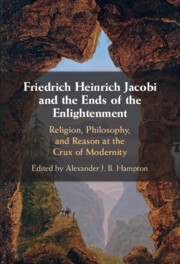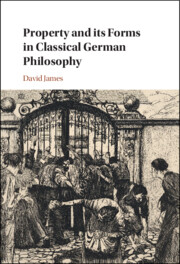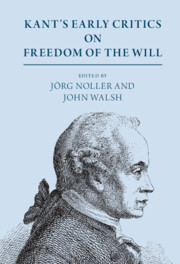38 results
Chapter 21 - Goethe and German Idealism
- from Part IV - Philosophy and Science
-
-
- Book:
- Goethe in Context
- Published online:
- 16 May 2024
- Print publication:
- 23 May 2024, pp 206-215
-
- Chapter
- Export citation
7 - Transcendental Revolutions
- from Part II - Revolution to Restoration (1790–1815)
-
-
- Book:
- The Cambridge History of European Romantic Literature
- Published online:
- 10 January 2024
- Print publication:
- 09 November 2023, pp 223-254
-
- Chapter
- Export citation
8 - Citizens of the World
- from Part II - Revolution to Restoration (1790–1815)
-
-
- Book:
- The Cambridge History of European Romantic Literature
- Published online:
- 10 January 2024
- Print publication:
- 09 November 2023, pp 255-283
-
- Chapter
- Export citation
Introduction
-
-
- Book:
- Friedrich Heinrich Jacobi and the Ends of the Enlightenment
- Published online:
- 09 February 2023
- Print publication:
- 16 February 2023, pp 1-6
-
- Chapter
- Export citation
14 - Jacobi and the Romantics
- from Part IV - Jacobi’s Impact on Idealism and Romanticism
-
-
- Book:
- Friedrich Heinrich Jacobi and the Ends of the Enlightenment
- Published online:
- 09 February 2023
- Print publication:
- 16 February 2023, pp 267-285
-
- Chapter
- Export citation
13 - Jacobi’s Philosophy of Faith in Fichte’s 1794 Wissenschaftslehre
- from Part IV - Jacobi’s Impact on Idealism and Romanticism
-
-
- Book:
- Friedrich Heinrich Jacobi and the Ends of the Enlightenment
- Published online:
- 09 February 2023
- Print publication:
- 16 February 2023, pp 245-266
-
- Chapter
- Export citation

Friedrich Heinrich Jacobi and the Ends of the Enlightenment
- Religion, Philosophy, and Reason at the Crux of Modernity
-
- Published online:
- 09 February 2023
- Print publication:
- 16 February 2023
Introduction
-
- Book:
- Hegel's Logic and Metaphysics
- Published online:
- 26 April 2023
- Print publication:
- 26 January 2023, pp 1-38
-
- Chapter
- Export citation
Chapter 2 - The Ontological Proof as “the True Critique of the Categories and of Reason”
-
- Book:
- Hegel's Logic and Metaphysics
- Published online:
- 26 April 2023
- Print publication:
- 26 January 2023, pp 63-107
-
- Chapter
- Export citation
Chapter 2 - Fichte on Property and Labour
-
- Book:
- Property and its Forms in Classical German Philosophy
- Published online:
- 22 December 2022
- Print publication:
- 05 January 2023, pp 48-88
-
- Chapter
- Export citation
Chapter 6 - Schopenhauer in Dialogue with Fichte and Schelling: Schopenhauer’s Critique of Moral Fatalism and His Turn to Freedom from Willing
-
-
- Book:
- Schopenhauer's 'The World as Will and Representation'
- Published online:
- 08 December 2022
- Print publication:
- 22 December 2022, pp 123-141
-
- Chapter
- Export citation

Property and its Forms in Classical German Philosophy
-
- Published online:
- 22 December 2022
- Print publication:
- 05 January 2023
11 - Romanticism and Existentialism
- from Part I - Psychology’s Historical Foundations
-
- Book:
- History and Systems of Psychology
- Published online:
- 04 November 2022
- Print publication:
- 17 November 2022, pp 202-217
-
- Chapter
- Export citation
Chapter 3 - Kierkegaard on the Self and the Modern Debate on Selfhood
-
-
- Book:
- Kierkegaard's <I>The Sickness Unto Death</I>
- Published online:
- 26 August 2022
- Print publication:
- 21 July 2022, pp 42-60
-
- Chapter
- Export citation
Johann Gottlieb Fichte, Review of “Skeptical Reflections on Freedom of the Will with Respect to the Most Recent Theories on the Same by Leonhard Creuzer, 1793,” Allgemeine Literatur-Zeitung 303 (1793), Cols. 201–205
- from IV - Freedom and Skepticism
-
- Book:
- Kant's Early Critics on Freedom of the Will
- Published online:
- 24 March 2022
- Print publication:
- 31 March 2022, pp 207-212
-
- Chapter
- Export citation

Kant's Early Critics on Freedom of the Will
-
- Published online:
- 24 March 2022
- Print publication:
- 31 March 2022
1 - Hegel’s Account of Alienation in The Phenomenology of Spirit
- from Part I - The Beginning
-
- Book:
- Hegel's Century
- Published online:
- 14 October 2021
- Print publication:
- 28 October 2021, pp 17-38
-
- Chapter
-
- You have access
- HTML
- Export citation
Chapter 1 - Introduction: The Spinoza Connection, or the Discovery of “Feeling”
-
- Book:
- Hegel and the Challenge of Spinoza
- Published online:
- 17 September 2021
- Print publication:
- 30 September 2021, pp 1-24
-
- Chapter
- Export citation
Chapter 3 - The Transcendental Spinozism of the Wissenschaftslehre
-
- Book:
- Hegel and the Challenge of Spinoza
- Published online:
- 17 September 2021
- Print publication:
- 30 September 2021, pp 57-87
-
- Chapter
- Export citation
Chapter 2 - The Nature of “Nature” in Contention
-
- Book:
- Hegel and the Challenge of Spinoza
- Published online:
- 17 September 2021
- Print publication:
- 30 September 2021, pp 25-56
-
- Chapter
- Export citation



